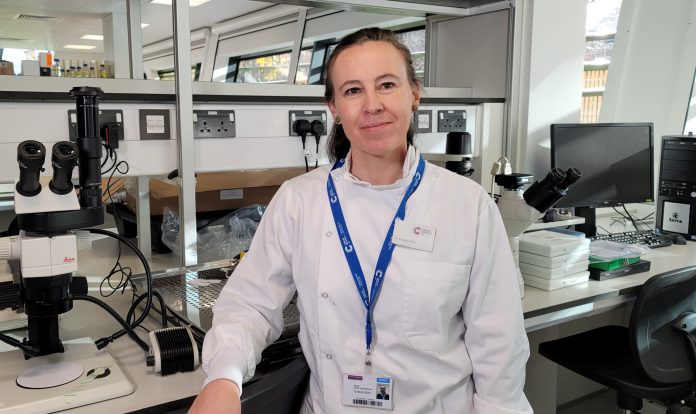A MANCHESTER scientist has been awarded a £1.5m grant to fund research into the treatment and prevention of skin cancer.
The funding boost from Cancer Research UK will help researchers predict how melanoma – the most serious form of skin cancer – is likely to spread and to which part of the body.
These cues could offer targets for therapeutic treatment and help scientists discover ways to prevent melanoma from returning.
The grant has been awarded to Dr Amaya Viros and her team at the CRUK Manchester Institute, and work on the five-year study has already begun.
Her lab focuses on the development of post-surgery treatment for patients at high risk for melanoma progression and looks at how ageing can influence it.
Executive Director of Research and Innovation at Cancer Research UK, Iain Foulkes said: “Our investment of £1.5 million in Manchester expertise in melanoma is going to be vital for helping scientists understand how melanoma spreads around the body and allow them to predict where it might spread to.
“This funding is an important step towards more targeted treatment and more importantly research into how to stop disease progression, which is the most common cause of death from cancer. We hope this funding will greatly benefit those people diagnosed with melanoma in the future.”
Dr Viros, who was awarded the Rising Star Award in 2018 by the European Society for Dermatological Research, said: “My team will examine melanoma in human and mice tissue samples, exposed to different environments, to find cues which predict whether a melanoma cell will be able to travel to another organ.
“The focus of our research will work to discover signals that impact disease progression and immunotherapy response, offering new metabolic and site-specific targets to find ways to stop this progression and improve response to treatment.”
The funding comes following analysis which shows the number of people diagnosed with melanoma has risen to a record 17,500 per year in the UK* with cases set to soar by around 50 per cent over the next two decades.**
Latest figures show that 40 people are diagnosed with melanoma every week in the North West – that’s more than 2,000 people a year.***
Dr Viros added: “Melanoma is the UK’s fifth most common cancer, and while more people are seeking treatment earlier and survival is improving, cases of the disease are predicted to continue to rise. Because of this we need more tools to help patients at risk of cancer metastasis, which is the spread of cancer cells, and this study will help these patients by identifying ways to block that progression from happening.”
Andy Mount, 40, from Rochdale, was successfully treated for melanoma in 2011 after what he thought was a skin tag on his leg suddenly began to bleed.
 More than 12 years since his diagnosis the father of two says there’s not a day goes by when he doesn’t feel lucky to be alive.
More than 12 years since his diagnosis the father of two says there’s not a day goes by when he doesn’t feel lucky to be alive.
Andy, an IT manager, who lives with his wife and two sons in Shawclough, welcomes the study, he said: “Being diagnosed with stage three melanoma at 27 was a huge shock to me. I do feel lucky to be alive. My experience was really frightening, and I still see my dermatologist every six months for my remaining moles to be monitored.
“This study could really benefit people like me. By finding out more about how melanoma can spread it could further improve treatments and ultimately help to save more lives of those people diagnosed with melanoma in the future.”







